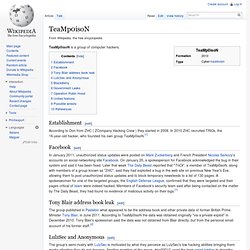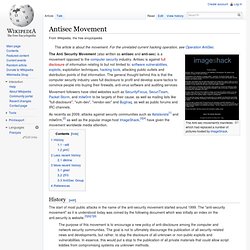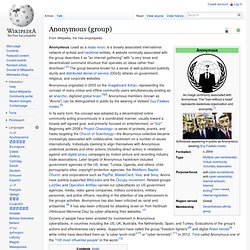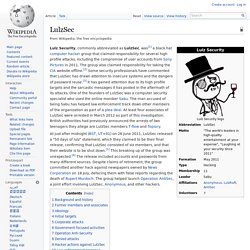

OwnCloud. TeaMp0isoN. TeaMp0isoN is a group of computer hackers.

Establishment[edit] According to Don from ZHC ( ZCompany Hacking Crew ) they started in 2008. In 2010 ZHC recruited TRiCk, the 16-year-old hacker, who founded his own group TeaMp0isoN.[1] Facebook[edit] In January 2011, unauthorized status updates were posted on Mark Zuckerberg and French President Nicolas Sarkozy's accounts on social-networking site Facebook. Tony Blair address book leak[edit] The group published in Pastebin what appeared to be the address book and other private data of former British Prime Minister Tony Blair, in June 2011.
LulzSec and Anonymous[edit] The group's semi-rivalry with LulzSec is motivated by what they perceive as LulzSec's low hacking abilities bringing them media attention they do not deserve. BlackBerry[edit] During 2011 England riots it was believed that BlackBerry Messenger service was used by looters for collaboration. Government Leaks[edit] Operation Robin Hood[edit] United Nations[edit] Possible arrests[edit] Antisec. The Anti-sec movement's manifesto which had replaced a number of pictures hosted by ImageShack.

Movement followers have cited websites such as SecurityFocus, SecuriTeam, Packet Storm, and milw0rm to be targets of their cause, as well as mailing lists like "full-disclosure", "vuln-dev", "vendor-sec" and Bugtraq, as well as public forums and IRC channels. As recently as 2009, attacks against security communities such as Astalavista[1] and milw0rm,[2] as well as the popular image-host ImageShack,[3][4] have given the movement worldwide media attention.
History[edit] The start of most public attacks in the name of the anti-security movement started around 1999. The "anti-security movement" as it is understood today was coined by the following document which was initially an index on the anti.security.is website.[5][6][7][8] The purpose of this movement is to encourage a new policy of anti-disclosure among the computer and network security communities. ~el8[edit] Anonymous.
Anonymous (used as a mass noun) is a loosely associated international network of activist and hacktivist entities.

A website nominally associated with the group describes it as "an internet gathering" with "a very loose and decentralized command structure that operates on ideas rather than directives". The group became known for a series of well-publicized publicity stunts and distributed denial-of-service (DDoS) attacks on government, religious, and corporate websites. Anonymous originated in 2003 on the imageboard 4chan, representing the concept of many online and offline community users simultaneously existing as an anarchic, digitized global brain.[3][4] Anonymous members (known as "Anons") can be distinguished in public by the wearing of stylised Guy Fawkes masks.[5] In its early form, the concept was adopted by a decentralized online community acting anonymously in a coordinated manner, usually toward a loosely self-agreed goal, and primarily focused on entertainment, or "lulz".
Lulzsec. Background and history Some in the security community contended that the group raised awareness of the widespread lack of effective security against hackers.[17] They were credited with inspiring LulzRaft, a group implicated in several high-profile website hacks in Canada.[18] Former members and associates LulzSec consisted of seven core members.[22] The online handles of these seven were established through various attempts by other hacking groups to release personal information of group members on the internet, leaked IRC logs published byThe Guardian, and through confirmation from the group itself.[27] Other members still may be active as to this time, they have not yet been identified.

Ideology An ASCII graphic used by the group in its Chinga La Migra torrent,[42] an associated statement,[43] and also appearing in press coverage.[44] The group's latest attacks have had a more political tone. Initial targets The group's first attacks came in May 2011. Corporate attacks Denied attacks See also.